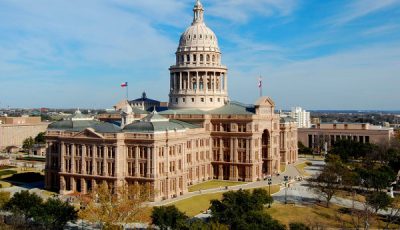TX Lawmakers Approve Porn Filtering Amendment to Rural Broadband Bill
 AUSTIN — The Republican-dominated state legislature in Texas successfully amended House Bill (HB) 5, a proposal to expand rural broadband access throughout the state. A seemingly uncontroversial bill up until last week now is a vehicle for social conservative Republicans in the state House of Representatives trying to impose porn filtering language into the final product of the bill. State Rep. Jeff Cason, a Bible-thumping Evangelical from the Dallas-Fort Worth suburb of Bedford, introduced Amendment 8 during a floor debate on HB 5 on Thursday, April 8.
AUSTIN — The Republican-dominated state legislature in Texas successfully amended House Bill (HB) 5, a proposal to expand rural broadband access throughout the state. A seemingly uncontroversial bill up until last week now is a vehicle for social conservative Republicans in the state House of Representatives trying to impose porn filtering language into the final product of the bill. State Rep. Jeff Cason, a Bible-thumping Evangelical from the Dallas-Fort Worth suburb of Bedford, introduced Amendment 8 during a floor debate on HB 5 on Thursday, April 8.
Other adult industry news outlets cited the conservative political blog Texas Scorecard for officially breaking the news. I reviewed several other media reports from the area, and Amendment 8 isn’t even mentioned, meaning either that the local news finds it non-controversial, or the fanfare for the porn filtering language was kept to a minimum.
Amendment 8 changes House Bill 5 to offer preferential treatment to internet service providers (ISPs) that offer their internet and broadband services as “porn filtered.” According to the approved amendment language, applicants to the rural broadband program will be given priority if the “the broadband provided by the applicant will maintain a program to, by default, block access to pornographic or other obscene materials.”
Rep. Cason justified the amendment by stating that “pornography currently stands as an enabler to both human trafficking and the sexual exploitation of mostly women throughout our state.”
“For customers to have access to this material, provided by taxpayer-funded broadband service, they should be required to opt-in, not opt-out, of such access.”
Such logic runs counter to existing legal and industry sentiments that promote open internet provisions. Even without federal net neutrality, internet service providers claim to be pro-open internet. It would do well for the internet service providers involved in the expansion of rural broadband to oppose House Bill 5, so long Amendment 8 remains attached to the proposal. Cason’s claims, too, are popular talking points among social conservatives and anti-porn advocacy organizations like the extremist group NCOSE and the morons behind the TraffickingHub movement.
Utah Gov. Spencer Cox signed into law the controversial House Bill 72 that social conservative state lawmakers proposed. For a reminder, HB 72 in Utah mandates that every single mobile phone and tablet sold in the state must come preinstalled with porn filtering software as a measure to protect children from inappropriate content. This is an ostensible mission, given that House Bill 72 is teeming with unconstitutional provisions, including the repression of First Amendment protections and the unlawful regulation of interstate commerce.
House Bill 5 in Texas does something similar. Though the broadband expansion program is a taxpayer-funded incentive for ISPs, the implementation of infrastructure and the actual provisioning of broadband access is dependent upon private enterprises that are entitled by the First Amendment to self-regulate and manage their broadband in a way they see fit (based on current law, of course).
By allowing Amendment 8 to be attached to House Bill 5, it is a signal that voters in Texas are allowing state government officials to regulate legitimate commerce over the internet.
Imagine a scenario where a small town-Texas performer relies on broadband access to earn a living and to keep up their social media presence; before House Bill 5, the performer likely had very poor internet access and made do with what was available. Then comes the effort to expand high-speed broadband in their area, through the form of House Bill 5 and the seemingly bipartisan collaboration of the Abbott administration and the Republican supermajority in the Texas legislature. With Cason’s Amendment 8, the porn filtering language directly harms the performer’s ability to continue working and making an income through the means that they prefer. See the problem? The performer would be the victim of an unintended consequence, impacting thousands more (I’m sure) that do similar work in the over 400 towns with fewer than 1,200 residents across the state.
The Texas Senate unanimously passed a companion bill to House Bill 5 on April 1, which drastically expands the state’s broadband infrastructure in rural communities. Republican Gov. Greg Abbott included the passage of broadband expansion on his emergency policy agenda for this year’s regular session. Beginning in the Senate, the House Bill 5 variation of the proposal moved to the far more conservative House and still awaits final action before its reconciled by leadership in both houses of the state legislature and sent to the desk of Gov. Abbott for an inevitable signature.
Amendment 8 should be cut from the final readout of House Bill 5, or the outcomes could be catastrophic.
Texas State Capitol photo by LoneStarMike licensed under the Creative Commons Attribution 3.0 Unported license. It has been cropped and resized.













